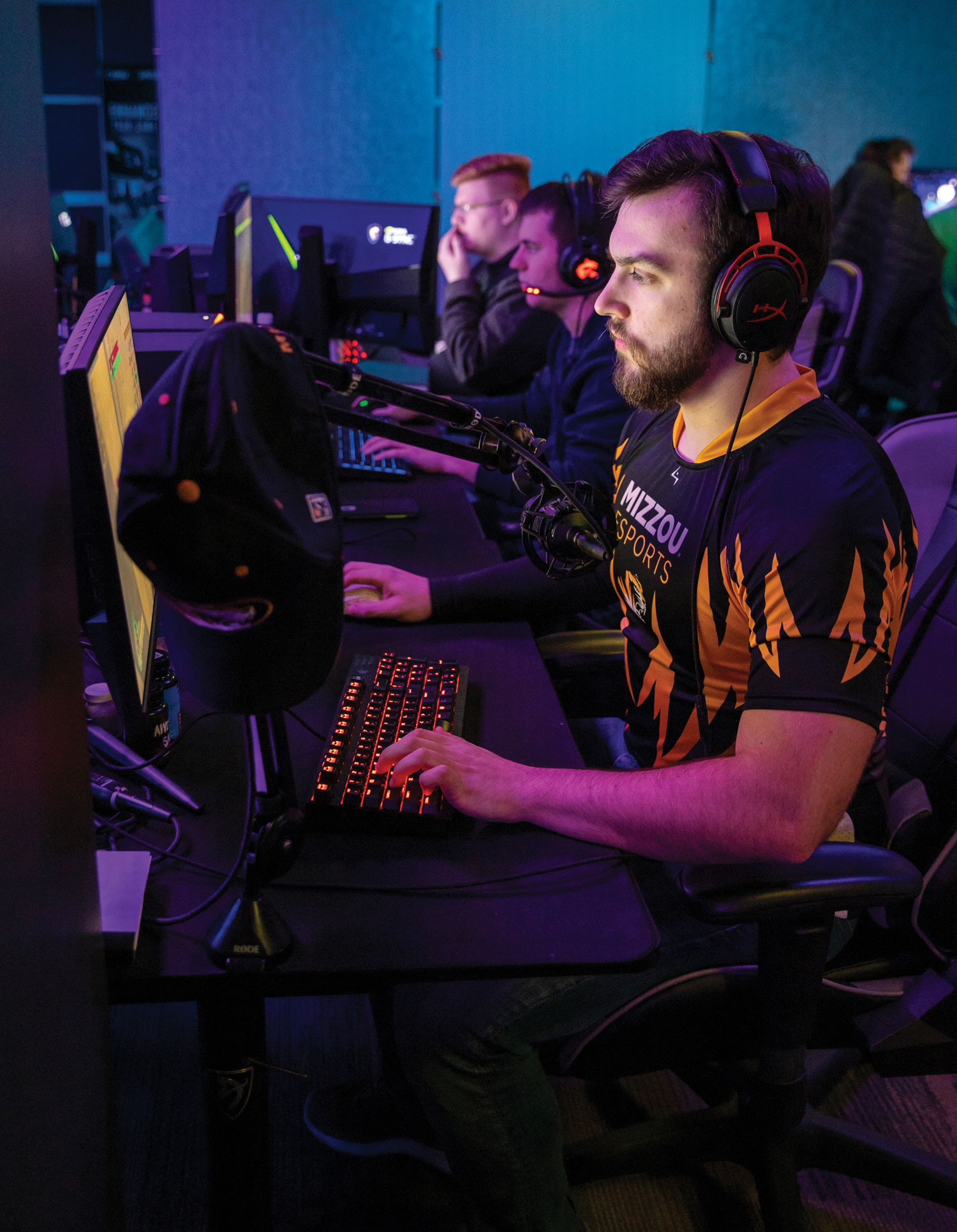
Story by Kelsey Allen, BA, BJ ’10
Photo by Sam O’Keefe
Jack “Skiritai” Vickers was sitting in his dorm room at Kansas State playing the team-based, multiplayer video game Overwatch when he got a text from his dad that would change his life. It was a link to a tweet of a press release announcing that Mizzou would be launching a competitive gaming team in fall 2019.
Vickers grew up in a video-game-playing family. “It was a family ritual,” he says. “We’d all hop on at night and play.” He knew that some small colleges had varsity teams — Harrisburg University in Pennsylvania, Maryville University in St. Louis — but he wanted the big-campus experience. So he opted for K-State, which had an Overwatch club team.
Now Mizzou was not only forming an esports team that would compete in Overwatch, League of Legends and Rocket League, but it would also offer $150,000 in scholarship packages. Within 48 hours, Vickers and more than 1,200 other students from across the country filled out the interest form to be part of Mizzou Esports.
Head Coach and General Manager Kevin Reape, BS BA ’14, wasn’t surprised. Esports is the fastest-growing sport with a global audience reaching almost 500 million fans annually. Nearly 75 percent of 14- to 21-year-olds either watch or play video games online. “High school students are realizing that they’re extremely talented in these games and, for the first time ever, there are scholarship opportunities available to them,” says Reape, who works in Student Affairs and was a Master-level player in Overwatch. And Mizzou is a front-runner in the esports industry: It’s the first SEC school to join the National Association of Collegiate Esports (NACE) and one of the largest universities in the nation to launch a program.
But Reape didn’t only want to recruit the best gamers in the nation; he was also looking for bright students, critical thinkers, problem-solvers, good communicators, team players. “My philosophy since Day One has been to develop a culture that embodies what the University of Missouri is all about,” he says.
In August 2019, 21 Mizzou Esports players, including Vickers, who is now a junior information technology major at MU, gathered in a 5,000-square-foot training facility in Center Hall — one of the largest university gaming facilities in the nation. Thanks to a four-year sponsorship agreement with a leading computer hardware and gaming company, MSI, and a $130,000 gift from an anonymous donor, the MSI Training Facility is outfitted with state-of-the-art gaming systems, a streaming room where the student-athletes can broadcast their games on Twitch (the ESPN of gaming), and a film room where teams can break down game film and strategize.
Mizzou Esports players are responsible for devoting 20 hours a week to the team, which includes practices, competition, study hours, team meetings and team dinners. Practices typically consist of reviewing game film, scrimmages with other colleges, and working on how players can better communicate and strategize with teammates.
Practice paid off. Mizzou Esports took home the NACE Rocket League Championship, claiming the crown ahead of 64 other collegiate teams, and completed an undefeated season. The Overwatch team was one of 12 teams out of more than 100 applicants chosen to compete in the Varsity Invitational. And the student-athletes got it done in the classroom, too, with a cumulative GPA of 3.08.
Because Mizzou’s esports program is overseen by the Office of Student Affairs, the program has a focus broader than competition. It also includes opportunities for non-team member students who are interested in the gaming industry to get real-world experience. Broadcast journalism majors can provide play-by-play and color commentary during competitions. Video production students can gain experience editing highlight reels for the teams. Marketing students can assist with social media and branding. Stats majors can contribute to game analysis and strategy. Through the partnership with MSI, Mizzou Esports is also building a pay-to-play public gaming lounge for the campus community with high-end broadcasting capabilities and a viewing area for fans.
“There are a lot of students interested in gaming, and we’re providing those with that interest a home away from home,” says Vice Provost for Student Affairs William Stackman, MS ’82. “It’s very similar to other NCAA sports in that way — it provides a sense of belonging and a way for them to use their passions to get involved and engaged.”
Esports has become another avenue for Mizzou to attract students, celebrate the array of interests on campus and invest money to benefit more of the student body.
“For Mizzou to support esports at the level it has and now for the teams to compete and succeed at the level that they have, it’s another pride point for the university,” Reape says. “And we’re just getting started.”
To read more articles like this, become a Mizzou Alumni Association member and receive MIZZOU magazine in your mailbox. Click here to join.



